When GDP Goes Up and Democracy Goes Down
America's economic trajectory has been on a precipitous path downward, with the latest "Big Beautiful Bill" passed by Congress exemplifying the country's increasing reliance on an extractive economy that prioritizes profit over people. The bill slashes Medicaid by $1 trillion, cuts anti-hunger programs by $295 billion, and delivers tax breaks to the top 20% of earners, with 72% of all benefits going directly to these wealthy individuals. This decision has led to a staggering 16 million Americans projected to lose healthcare coverage, leaving families without access to essential services.
Meanwhile, the bill allocates $170 billion for immigration enforcement, ballooning ICE's budget from $10 billion to over $100 billion. To put this into perspective, Israel spends less on its entire military during wartime – a stark contrast to the vast resources dedicated to chasing after undocumented immigrants. This expenditure highlights the country's priorities and underscores the value placed on maintaining a strict border control.
The True Cost of Trump's Economic Agenda
Trump's economic policies have been instrumental in hollowing out America's democratic institutions, leaving citizens with little recourse against the increasing power of corporate interests. The "Big Beautiful Bill" is merely the latest example of this trend, with the President's administration consistently prioritizing the needs of Wall Street over those of working-class Americans.
Furthermore, this economic agenda has led to a growing perception among citizens that democracy itself is in jeopardy. As the nation becomes increasingly reliant on GDP growth, the value placed on human life and dignity begins to erode. This phenomenon is not unique to America; globally, countries such as Poland and Hungary have seen their democratic institutions undermined by the allure of rapid economic growth.
The Illusion of Economic Growth
But what exactly does this economic growth represent? GDP metrics may flatter a nation's image, but they fail to capture the true essence of productive capacity. When communities are sold off to private entities, public infrastructure is privatized, and social services are cut – the cost to human lives becomes increasingly apparent.
This phenomenon was anticipated by Simon Kuznets, who warned in 1934 that GDP could not be a reliable measure of national welfare. Despite this warning, the global standard for economic growth became entrenched, with policymakers consistently prioritizing Wall Street metrics over genuine development.
The Real Cost of Extraction
The extraction economy has become an insidious force in American society, hollowing out communities and eroding democratic institutions. The "Big Beautiful Bill" is merely a symptom of this disease, highlighting the need for policymakers to prioritize human needs over profit-driven interests.
A New Vision for America
Corbin Trent, an Appalachian factory owner turned political strategist, argues that America must adopt a new economic vision – one that prioritizes productivity and genuine development. By investing in infrastructure, manufacturing capacity, and social programs, policymakers can create a more equitable society where workers have leverage and real power.
This requires a fundamental shift away from GDP growth as the sole metric for success. Instead, policymakers must prioritize real production and human well-being, recognizing that economic freedom is inextricably linked to genuine empowerment.
The Path Forward
Ultimately, America's future will be shaped by its economic policies – a choice between an extractive economy and one that prioritizes human needs. As the nation grapples with the consequences of the "Big Beautiful Bill," it is crucial that policymakers recognize the value of genuine development over profit-driven interests.
A Better Religion
The time has come to abandon GDP as a false god, embracing instead a vision for America that prioritizes productivity, human well-being, and real economic growth. By doing so, policymakers can create a more equitable society where workers have true leverage – and democracy itself is strengthened.
